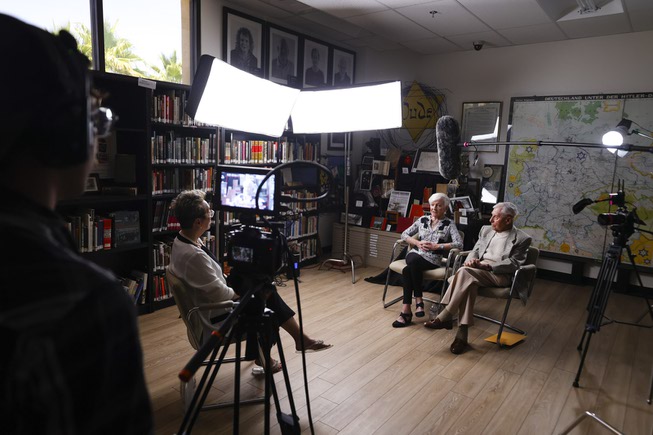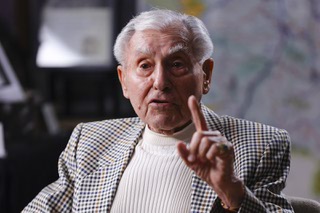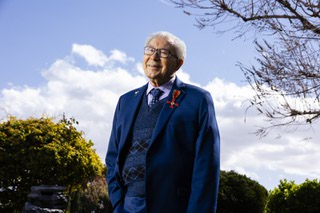
Director Ann Raskin, left, interviews Holocaust survivors Lilo Kuechel, 91, center, and Alexander Kuechel, 99, right, during the filming of a documentary at Sperling Kronberg Mack Holocaust Resource Center Friday, June 30, 2023.
Thursday, July 6, 2023 | 2 a.m.
Ann Raskin sits under bright lights in the Sperling Kronberg Mack Holocaust Resource Center in Summerlin and wipes away tears while Alexander “Alex” Kuechel recites a poem. Oct. 19, 2022
In it, he laments about lives lost, the burning of synagogues and destruction of torahs in the streets.
But he also sings about how he will never — and must never — forget.
“My God, my soul is tormented,” Kuechel says in his poem. “It is so much pain to remember ... so much pain ... but it is so hard to forget.”
It’s one he wrote decades ago, and although he immortalized it on paper in 1972, the 99-year-old Holocaust survivor now has it and his own life story caught on film.
Kuechel and his wife, fellow Holocaust survivor Lilo, are part of a larger documentary to preserve the stories and spread the inspirational messages of Ben Lesser — a fellow Holocaust survivor based in Southern Nevada.
The documentary is called “Commit to a Life That Has Meaning - A Life That Matters, Inspired by Holocaust Survivor, Ben Lesser” and is helmed by the 70-year-old Raskin.
Raskin, a retired Clark County School District teacher who lives in Utah, first discovered Ben Lesser and the local community of Holocaust survivors while still teaching. The superintendent of CCSD at the time, Walt Ruffles, sent out a list to all teachers of Holocaust survivors that could be available to speak in their classes.
Several of the survivors, including Lesser, spoke to Raskin’s classes, and she fostered friendships with many of them over the years. She and Lesser have known each other for 20 years, and Raskin said she even helped him write the curriculum for his foundation,
After hearing his “inspirational” story, Raskin decided to make it her mission to help spread Lesser’s message of hope and remembrance.
“It’s my dream,” Raskin said. “If I had to do this, it would be the rest of my life.”
With the help of Utah’s House Bill 60, which allows that state’s residents 62 years and older to register for college credit classes for the nominal fee of $25 per term, Raskin recently returned to college to study digital film and film editing.
Raskin said it was all in an effort to create the documentary about Lesser and other Holocaust survivors who call Las Vegas home.
The project started as an eight-minute video for a class project, on which some of her current crew helped.
After hearing Lesser’s story, Raskin said the crew — many of whom are in their 20s — jumped on to help make a full documentary about him, and it has since come to include other survivors, like the Kuechels.
Their budget? Absolutely nothing, according to film producer Lane Palmer.
The crew “all have commitments in their life, and they gave their time because they feel as strongly as I do that Ben’s message needs to be heard,” Raskin said.
Harrowing journey
Chased out of his home country by antisemitic attacks, the Poland-born Lesser escaped to Hungary and was captured by German soldiers six months later in 1944.
He was sent to the Auschwitz-Birkenau concentration camp. He survived a seven-week death march and captivity in four different concentration camps – Auschwitz-Birkenau, Durnhau, Buchenwald and Dachau.
In a conversation with the Sun earlier this year, Lesser said he spent three weeks in a cattle car attached to a train heading toward Buchenwald from Dachau. He had survived only on crumbs of a bread roll he smuggled aboard.
Of the 5,000 prisoners on the train with Lesser, he was one of just 18 that survived and is the last one alive today, according to his daughter, Gail Lesser Gerber.
Since immigrating to the United States in 1947, Lesser has started a family, built a successful career in real estate, wrote a book and now spends all of his time making sure that the world doesn’t “contract amnesia” about the Holocaust through his organization, the Zachor Holocaust Remembrance Foundation.
He was presented with the Cross of the Order of Merit — Germany’s highest citizen honor — for his work educating people across the globe about the Holocaust through a free curriculum.
“There are a lot of Nazis (in Germany), and there are a lot of Nazis right here in the United States, and this is so important that we point out that the memory has to be alive,” Lesser said in a conversation earlier this year. “People would love to forget about the atrocities that happened during the Holocaust, but as long as I’m alive, I won’t let them.”
The Kuechels share some of the same experiences. Alexander talked about how he survived seven different concentration camps — including Blechhammer, the second largest Auschwitz subcamp.
Lilo Kuechel didn’t spend time in any camps; she hid “underground” with her mother and the only older brother she had left in Germany. Her other two brothers had immigrated to Palestine, now the state of Israel, long before the Nazis’ reign of terror took hold.
Both her mother and brother had been denounced on separate occasions while in hiding and they eventually died at Auschwitz, she said. Lilo Kuechel was cared for by a man named Heinz for most of her remaining childhood.
During his time in the camp, Alexander Kuechel remembers certain moments, like the time he watched a man get three of his fingers sliced off by a soldier in Adolf Hitler’s SS. Other things, Alexander Kuechel has already forgotten, he said.
With the help of people like Raskin and her crew of filmmakers, Lesser, the Kuechels and other Holocaust survivors in Las Vegas are immortalizing their stories.
Raskin’s documentary about Lesser is not the first project to record Holocaust survivors in Southern Nevada.
From 2014 to 2016, UNLV’s University Libraries also collected historical documents, photographs and biographies of various individuals from Southern Nevada’s Jewish community for the Southern Nevada Jewish Heritage Project.
The project’s collections are available on a website, special.library.unlv.edu/jewishheritage, created through a one-year grant from the Library Services and Technology Act, funded by the Institute of Museum and Library Services and administered by the Nevada State Library and Archives.
“The project’s goals are to conduct oral histories that capture firsthand testimony about Jewish life in Las Vegas; to seek personal and organizational archives about the community and ensure their preservation; to provide online access to selected historical resources that support research, teaching, and learning; and to engage the Jewish and Las Vegas communities in appreciation of this rich history,” the UNLV University Libraries said on website.
Within the first year, the UNLV University Libraries said they were able to collect “58 oral history interviews, recorded four roundtable discussions with members of the Jewish community and digitized 43 historical oral histories.”
An additional 19 new archival collections and 1,500 digital files were donated to UNLV for long-term preservation, making almost 2,000 items published online by July 2015, they noted.
Lesser and Alec Kuechel’s stories are both included in the collection.
The Sperling Kronberg Mack Holocaust Resource Center in Summerlin — where the Kuechels were filmed by Raskin and her crew — contains shelves of information about the Holocaust.
That’s where Susan Dubin, a library consultant and education specialist, spends her days. As someone surrounded by portraits of survivors and books filled with history, Dubin knows all too well what happened during that time.
Much like Raskin, she believes it’s important that people continue to hear from survivors and learn about the Holocaust.
“Unfortunately many of our survivors are no longer with us, and as time goes on they’re not going to be here,” Dubin said. “The more we can document what their experiences were, the more we can share.”
Antisemitism and a lack of knowledge about the Holocaust are becoming more prominent as the world continues to lose its last survivors, Dubin said.
According to the Anti-Defamation League’s Audit of Antisemitic Incidents, last year there was a 36% increase in antisemitic incidents throughout the United States, up from 2,717 in 2021 to 3,697 in 2022. Nevada saw 30 of the recorded antisemitic incidents.
One person was killed as a result of antisemitic assault in 2022, according to the ADL.
The reason for the increase in antisemitic incidents cannot be attributed to one cause, according to the ADL. Organized white supremacist propaganda activity might be one of the biggest perpetrators, though. The spread of antisemitic propaganda by white supremacist networks doubled in 2022 from the previous year, said the ADL.
The world also saw a slew of high-profile individuals regurgitating antisemitic messages, like Ye — the rapper formerly known as Kanye West — and former President Donald Trump, who hosted Holocaust denier Nick Fuentes for dinner at his Mar-a-Lago estate in Florida last Nov. 22.
In 2020, what was described as the “first-ever 50-state survey on Holocaust knowledge of American millennials and Gen Z” recorded that 63% of all survey participants didn’t know that 6 million Jews were killed during the Holocaust.
The U.S. Millennial Holocaust Knowledge and Awareness Survey also found that 48% of national survey respondents could not name a single concentration camp of the more than 40,000 that existed during Hitler’s reign.
Dubin said there needed to be some way to correct all of the misinformation, which is part of why she does her current work.
“Everybody has wonderful amazing stories, and they’re all different,” Dubin said, staring at a wall of portraits of Holocaust survivors — including Lesser. “People ask me, ‘Don’t you get depressed doing this?’ and my answer is, ‘Not even a little bit because I have all of them around me.’ ”
With the interviews this past week now on film, Raskin and her crew now will turn their attention to editing and finishing the documentary. She said she to have the film completed by the end of the year and enter it into several film festivals in 20224, and she hopes to make it available for public screenings.
Those interested in supporting the completion costs of Raskin’s documentary can donate to the its GoFundMe.


